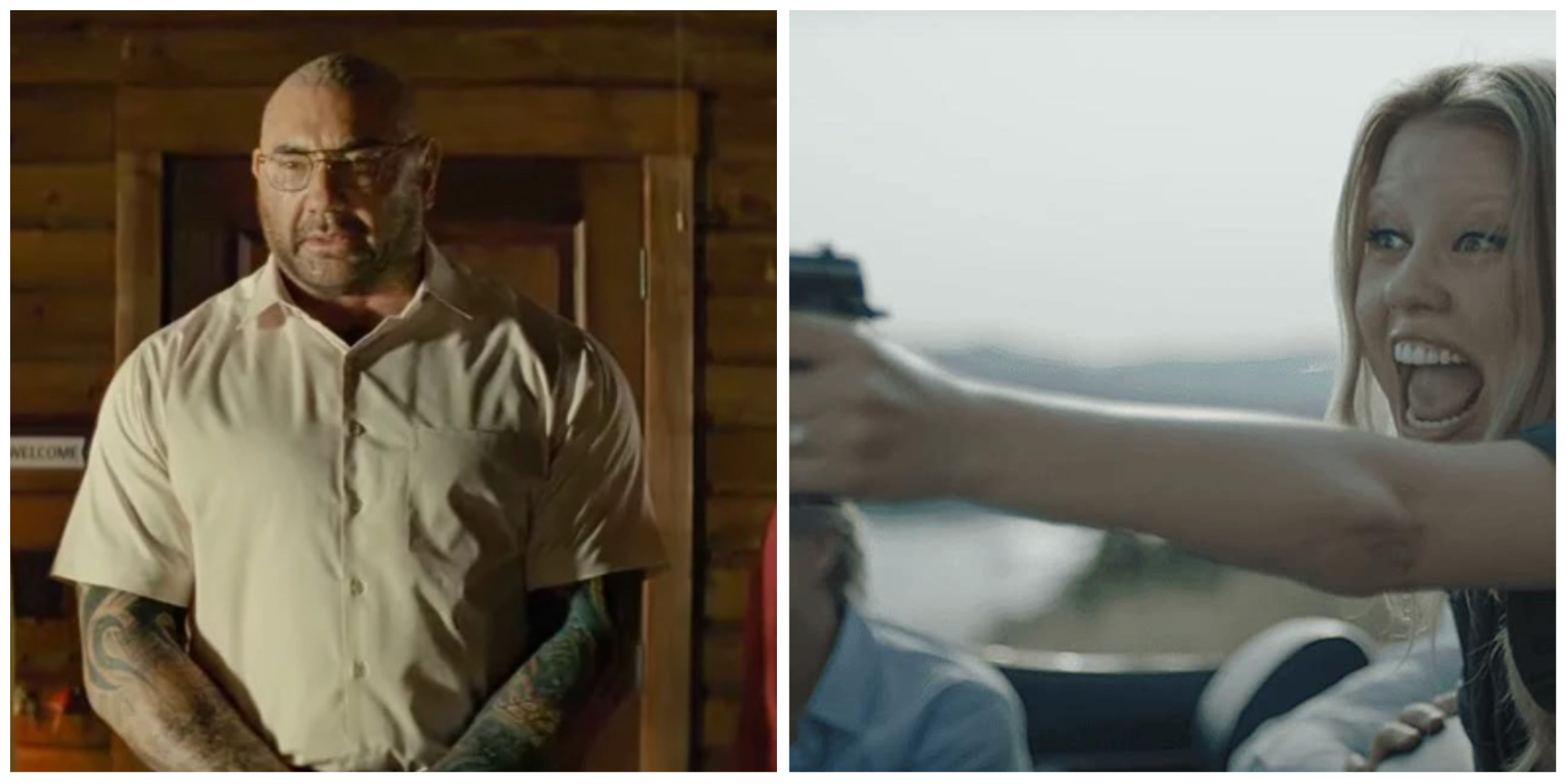When you watch Evel Knievel try to jump Snake River Canyon, it’s just as exciting a spectacle if he doesn’t make it—maybe even more so. (Look it up, youths.) That’s my only explanation for the uninterrupted success of M. Night Shyamalan. For each film, he begins with a high-concept premise so engaging you know there’s no way the actual movie will live up to it, so you buy your ticket just to watch his cycle plummet off the cliff.
Or so I’ve heard—from friends who’ve paid actual money to see the trees try to kill Mark Wahlberg, from reviewers professionally obligated to learn why the beach makes people old, Here’s where I admit that my knowledge of Shyamalan’s alleged failures over the past two decades is all secondhand, because the last of his films I watched in full was Signs in 2002. The movie’s tense buildup was the work of a skilled filmmaker; the conclusion, in which Mel Gibson’s faith in the almighty is restored once Joaquin Phoenix swings his baseball bat to smash water glasses and kill a kitschy-looking alien, was so insulting (to my intelligence, to Shyamalan’s talent, to space aliens whether they exist or not, and to god, who isn’t even real) I swore MNS off for good.
Since I felt so smugly secure in my decision, why break the streak when I got a good thing going? Well, one thing Knock at the Cabin has to offer is that it’s an adaptation of Paul G. Tremblay’s novel The Cabin at the End of the World, which I haven’t read but means at least we’re spared a twisty Shyamalan original story. Still, the novel hands Shyamalan the high-stakes kind of plot he typically favors: Four strangers show up, armed with homemade weapons, at a cabin where a couple is vacationing with their eight-year-old daughter. If one member of the family doesn’t sacrifice another, the visitors announce, the apocalypse will wipe out humanity.
Another bigger (and brawnier) thing Knock at the Cabin has going for it is Dave Bautista, in his first dramatic role. (He wears glasses and a button-down to prove he’s serious.) Watching the tattooed behemoth emerge from the woods while young Wen (a very cute Kristen Cui) collects grasshoppers (a little nod to the plagues to come) is an elementally terrifying image, summoning up Frankenstein memories. But massive Leonard is also gentle, imperturbable, and very good at coaxing information from nervous children: In no time he learns that Wen has two dads, their names, her favorite movie, and the origin of her lip scar. Only when he’s joined by his three less physically menacing but also less genial-seeming partners does Wen run back home.
Then comes the titular knock. Leonard’s accomplices are belligerent Masshole Redmond (Rupert Grint), scattered food service worker Adriane (Abby Quinn), and conflicted nurse Sabrina (Nikki Amuka-Bird). Haunted by visions and driven here on a mission, they present the two parents (and presumably Wen) with the film’s central dilemma. For the rest of the film, the suspense lies less in whether the family will escape (though they try) or even if the visitors are telling the truth (though Shyamalan half-heartedly sows some doubt) than in what the two dads, Eric and Andrew, will decide. Andrew (Ben Aldridge) emerges as the rationalist; Eric (Jonathan Groff) seems more prone to faith, or maybe that’s just the aftereffects of the concussion he suffered after Sabrina walloped him.
Shyamalan being Shyamalan, he can’t help but undercut the dramatic elements with his own directorial and thematic obsessions. Unnecessary flashbacks dilute the claustrophobic tension that comes from trapping seven people in a cabin. And though some of the slightly comic moments are intentional, some are un-: the director can’t resist showing examples of the apocalypse, which look like ridiculous outtakes from a Left Behind adaptation, and the sight of the flimsy Goff fighting off the mound of muscle that is Bautista is hard not to giggle at. Also, at one point Adriane pleads for the life of her son, describing him as a kid who likes pancakes. That’s it? That’s the most specific description you can provide of your child as he’s threatened with annihilation?
Somehow, Bautista’s reserved Leonard holds the film together, investing it with a gravity it doesn’t quite deserve. But eventually Shyamalan has to resolve the movie’s will-they-or-won’t-they, and he’s hardly the guy to generate enough depth of character from the relationship between Eric and Andrew to make the resolution emotionally resonant. He can’t stick the landing, and though it’s not a pure nosedive dramatically, ideologically (or—gag—spiritually, if you insist) it’s a con.
By tossing Eric and Andrew into this situation, Shyamalan illustrates the great crisis of our time: How do we act (or compel others to) when truth itself is a matter for debate? But honestly, who asked for his two cents? Without giving too much away, I’ll just complain that it’s downright dishonest when a movie stacks the deck against the “there has to be a reasonable explanation” character. Because in reality, there is a reasonable explanation (or at least a not-supernatural one) for most things, and for a filmmaker to smugly plunge a rationalist into an irrational fiction as a way of suggesting otherwise is the rankest kind of special pleading.
Is Andrew akin to a COVID denier? A climate change skeptic? A stop-the-steal truther? A guy who complains that his partner is too into astrology? Or someone on the other side of the debate with any of those people? A smarter writer/director might have made something out of those questions. Instead Andrew is just the latest he-of-little-faith that theists have long loved to chasten for a supposed lack of cosmic imagination. That’s a disappointment. But it’s not the end of the world.
***
The rich are different from you and me: If they commit crimes, they can clone themselves and have the duplicates executed in their stead. That’s the premise that Brandon Cronenberg stretches to its limits and beyond in Infinity Pool, which gorily explores what the psychological effects of watching your own murder might be.
Here, Alexander Skarsgård is stalled novelist James Foster, who owes his career to the fact that his rich and beautiful wife Em (Cleopatra Coleman) is his publisher’s daughter. While vacationing at a resort in Latoka, a fictional, gorgeous, exotic land where the natives are desperately poor and wear creepy masks, they meet another couple—always a sign of future trouble in a movie like this, especially when the woman is played by Mia Goth. Goth’s Gabi Bauer is, unlikely enough, a fan of James’s novel, and when the foursome goes on an illicit day trip outside the resort gates, she performs a secretive and remarkably efficient handjob to secure his attention.
Of course, something goes disastrously wrong on the drive back, plunging James and Em into the shadowy world of Latokan law enforcement, where anyone who can hand over a bundle of cash gets to (has to, actually) witness the slaughter of their clone scapegoat. (If it’s unclear why this impoverished nation has a secret facility capable of not only cloning human beings, but of implanting the original being’s memories into the duplicates’ brains, hey, grant Cronenberg his conceit.) Em is disgusted by witnessing James 2.0’s public execution, and by the fact that the real James is, to say the least, instead intrigued.
As I’m sure you know, mainstream movies are fascinated with punishing the super-rich these days, and Infinity Pool will add a couple more paragraphs to the ongoing thinkpiece someone is no doubt muddling through. Here, in the case of murder, the deceased’s relative gets to kill the duplicate, which means everyone is theoretically satisfied: The wronged get vengeance, and the rich avoid punishment. Which, if you think about it, is a pretty good metaphor for the experience of watching movies like Glass Onion or The Menu—we get to see fictional justice being done to simulations of powerful people, and the rich get to go about their business unscathed.
But in Infinity Pool (and maybe also in reality) surviving symbolic destruction only further empowers the rich, reassuring them of their ultimate untouchability. James begins palling around the others who have experienced his same fate; free from even the few consequences that the privileged might ordinarily face, they behave like monsters, as you might expect. If there’s a little Conrad to this (colonists are the true brutes), there’s a class element at play too: Maybe James has reservations about the amoral revels his new friends goad him into because he feels unworthy of his privilege—which, after all, he derives only through Em’s wealth.
Eventually—around the time of the hallucinogenic orgy, by my reckoning, when reality and illusion start to blur for James and, thus, for us—you have to wonder whether Cronenberg is setting himself adrift on silly pretension or consciously having a goof. Either way, his flights of psycho-dreamscapery are feats of impressive self-indulgence that dazzle more than they reveal, and there's nothing especially wrong with that. After all, we do get to see Skarsgård naked, collared, and leashed, if that’s what you’re into.
But Cronenberg expects Skarsgård’s broad shoulders to carry too much weight. He seems ideally cast—in films like Melancholia or Diary of a Teenage Girl, his obliviousness was a gift, that stunned yet aroused look in his eyes suggesting that he just stepped on a rake and kinda got off on being thwocked by the handle. (Even in The Northman he was a bit of a dupe.) But while Infinity Pool smartly exploits that tendency, Skarsgård is a little too blank as a performer to register the humiliating extremes to which James is subjected. He can’t portray a man whose identity is disintegrating because he projects a kind of vacancy to begin with.
Cronenberg is fortunate that his other lead has yet to find her limits, no matter how far she pushes. Coming off her triumphant twofer with Ti West last year in X and Pearl, Goth plays the glam seductress here with unruffled confidence. If she can maintain her self-awareness and stay true to her strengths without succumbing to self-parody, she might do something remarkable: make a name for herself as one of the great actors of her generation without straying from horror to more “respectable” films.
***
Finally, some thoughts on Skinamarink, which is not just available to stream today on Shudder but still lingering in local theaters. (Well, in one local theater, in Inver Grove Heights.) For those who haven’t followed the saga, director Kyle Edward Ball initially created creepy, impressionistic videos for his YouTube channel based on his commenters’ nightmares. The most recurring set-up, in Ball’s words—“I’m a little kid. I’m in my house. My parents are either dead or missing. And there’s a monster.”—became the premise for Skinamarink, which benefited from festival buzz and an accidental online leak. Congrats to him for smuggling an art film into the cineplexes, no matter how few and how briefly.
And really, that’s what Skinamarink is, despite its scraps of narrative and feints at horror convention. Even calling it an “art horror” movie seems a little excessive—it’s less a source of terror than a meditation on being terrified. It’s about fear, and a reminder of its sources. But mostly Skinamarink is a formal experiment, more at home in the Walker than in the Emagines nearby that housed it.
Whether Skinamarink is a good art film is a matter of debate. Rendering childhood fear as abstract art is certainly fascinating intellectually and, for some of the time, as a sensory experience. The fuzzy quality of the film suggests both late-night television snow and what it’s like a child to peer into darkness at night and imagine shapes emerging to haunt you. You're drawn into looking deeper.
Shot in Ball’s childhood home, Skinamarink is set in 1995 but feels more like the ’70s, the grainiest of all decades. But though there are a handful of striking images and a skeleton of a narrative, Skinamarink overstays its welcome at 100 minutes. A miniature distended to feature-length, it’d be an intriguing experiment at a tight 60 minutes or so. But then it wouldn’t be in cineplexes, would it?
Knock at the Cabin: C+
Infinity Pool: B+
Skinamarink: B–
Knock at the Cabin, Infinity Pool, and Skinamarink are now playing in area theaters.






